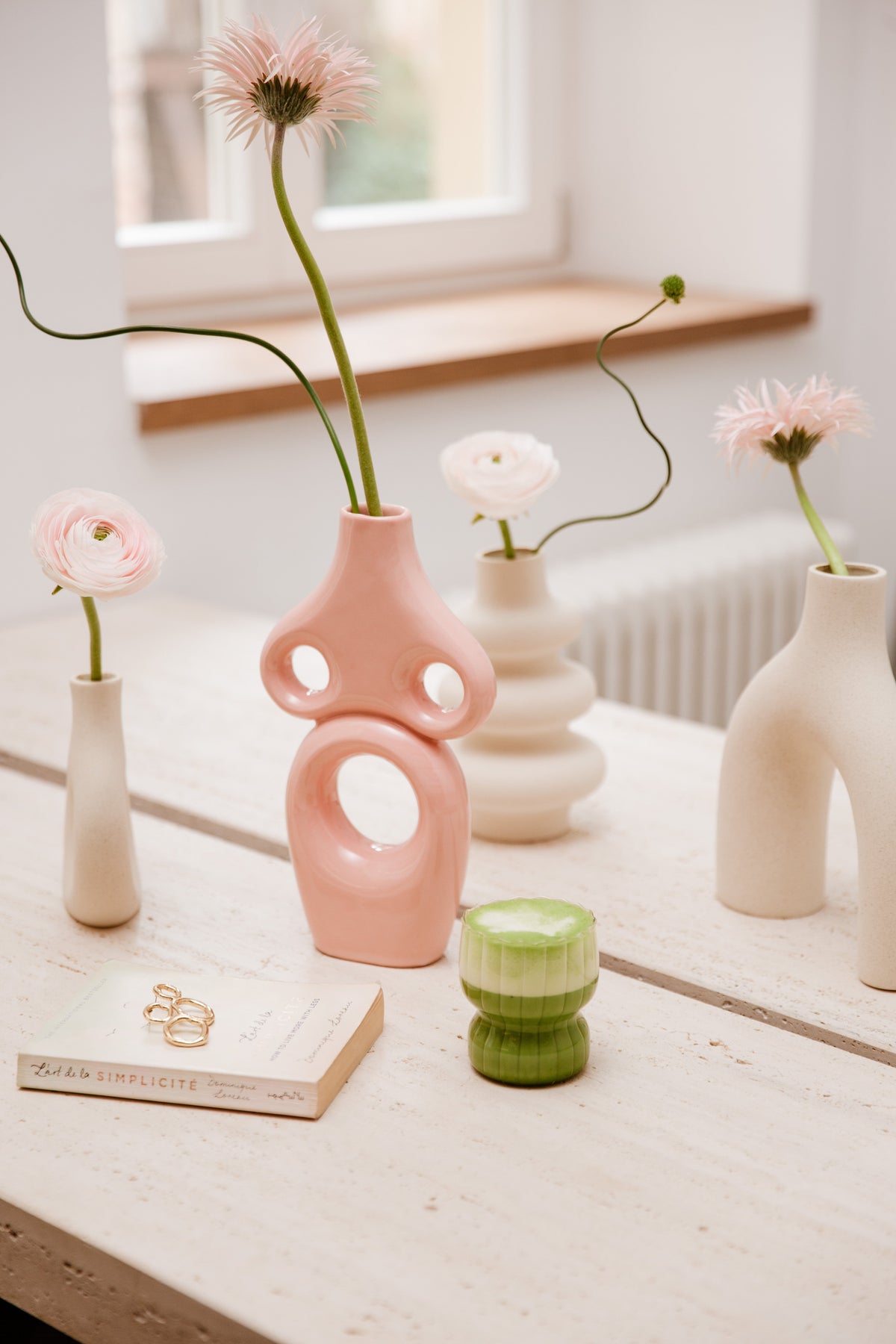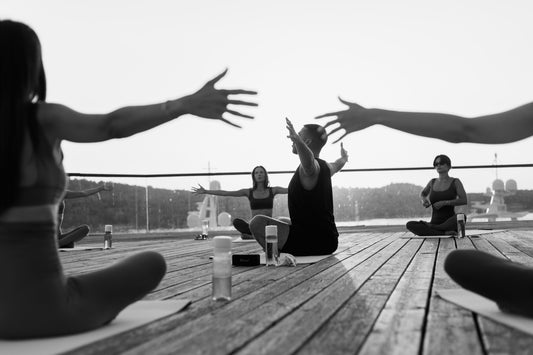Health That Comes from Relationships, Not Regimes
We often believe that health is something that is acquired -- like a degree. Once you "earn" it through proper nutrition and going to the gym or pilates, it's just there. Stable. Almost permanent. But the body often teaches us differently. The body teaches us patience, listening, and what we call process.
Long-term health doesn't happen overnight. And it's not just about the number of kilos or calories. It is created with every choice we make in the day. In the so-called "Blue Zones" (regions of the world with the longest-lived people -- Okinawa, Ikaria, Sardinia...) people don't live long because they exercise every day or watch their calories. Their health is not the result of discipline, but of a way of life that is rooted in presence, meaning, and togetherness.
They eat simply and seasonally. They move all day, but rarely "exercise". They have a strong sense of belonging and purpose. Their days are interwoven with silence, mutual help, rituals, and repetition of the familiar.
This doesn't mean we have to move to an island or start growing our own food. But we can ask: what can we adopt from this? Can we simplify meals, slow down afternoons, create a small community of care in our own home?
Sometimes the mind convinces us that we can ignore the signals the body sends us, but the body waits. Patiently, quietly. And when we finally approach it, it doesn't ask for the ideal, but for presence.

What is metabolic health, really?
Metabolism is much more than the speed at which the body burns calories. It is a complex system that governs every aspect of biological functioning -- from energy production, hormone regulation, and maintaining optimal blood sugar levels, to managing stress and maintaining inner balance.
When metabolism is balanced, the body functions quietly and efficiently. We wake up with ease, feel stable throughout the day, sleep comes naturally, and the ability to recover -- whether from stress, illness, or exertion -- becomes stronger.
But the modern lifestyle, the abundance of sedentary habits, refined diets, and chronic stress, gradually disrupt this delicate system. Symptoms such as low energy, insomnia, poor digestion, anxiety, and a constant feeling of exhaustion are often early signs of metabolic dysfunction.
The good news is that metabolism is not fixed through extreme measures, but through a series of careful, everyday decisions that carry the rhythm of slowing down and stabilization.
There is no need for drastic cuts or temporary solutions -- the body is made for adaptation, but it asks for space and time to reach that balance.
This is precisely why it is said that metabolic health is the foundation of longevity: because without inner balance, no other dimension of health can truly flourish. It is the silent architect of our energy, our resilience, and even our emotional capacity.
Understanding metabolism means starting to listen to the body not with the intention of controlling it, but to provide it with the conditions in which it can do what it does best -- heal itself.
These conditions are often created in quite ordinary moments. And they begin, as is usually the case, with habits that seem simple -- but have a deep impact:
Nutrition asks your permission not to be perfect
With the availability of all information today, we are overloaded with information about food -- what to remove, what to add, what to combine, and what never to mix. Although much of this information is valuable, its quantity and contradictoriness often leave a feeling of confusion. A meal, which should be a moment of self-care, becomes another space of control, pressure, and doubt.
Which food is good for the skin, which for hormones? Is it okay to eat fruit in the evening? Is breakfast mandatory? And so every day a new protocol, a new prohibition, a new hope. Food ceases to be food -- it becomes a strategy, a source of insecurity, another project.
But the body doesn't need a perfect formula. It needs simplicity. Food that doesn't excite it, but supports it. That doesn't cause mood and energy swings, but creates a sense of lightness and stability. Whole, seasonal foods -- prepared in moderation, in peace -- are often what the body sincerely rejoices in.
The rituals that accompany a meal -- tranquility, presence, warmth -- are sometimes as important as the nutritional value of what we eat. Warm soups. Bitter salads. A handful of nuts. A warm drink that replaces the afternoon coffee, without drastic energy spikes. A square of chocolate or a favorite cookie that doesn't encourage guilt, but satisfaction.
Nutrition that supports doesn't ask for constant optimization. It asks for listening. And permission not to be perfect, but to be good.

Movement that does not punish but invites, does not come from the need for results, but from relationship
For a long time, movement was understood as a tool for burning -- calories, excesses, wrong choices. The body was seen as something that needed to be fixed, tightened, redefined. Movement was losing its original function -- connection, presence, regulation.
Movement in the metabolic sense can be ten minutes of stretching in the morning, while it's still quiet. It can be rolling along the back and thighs in the evening. It can be a walk without purpose, without headphones, without a plan. It doesn't have to be intense to be important.
A body that regularly moves without pressure does not seek compensation. It does not rebel. It begins to trust. And then it starts to regulate -- blood flow, digestion, nervous system.
Rhythm is not necessarily the heart rate**. Rhythm is when the body moves and stops according to its own needs.** Not because of external goals, but because of inner balance.
Conscious breathing as the ultimate expression of loving ourselves
Breathing is the body's first and last action. And most often we do it unconsciously. But in the breath lies the quickest way to come back to ourselves. Breathing is a rhythm that does not require external infrastructure. It is not reserved for special occasions. It is enough to stop and feel it.
When the breath is shallow, the body remains in a state of readiness. When it is deep and focused, it begins to release. In the middle of the day, in traffic, among obligations -- a few conscious breaths in and out can be the difference between stress that accumulates and a moment that is breathed through.
Breathing and silence together make a return. It doesn't have to be a formal meditation. It can be a moment on the mat, a thoughtless walk, a bath in which the breath slows down. The scent of oil on the skin can be a reminder. The sound of silence -- a signal that not everything is up to us.
Let's make room for sleep in life
In the modern rhythm, security is rarely taken for granted. Late-night lights, screens, speed of thoughts, schedules without a break -- all of this sends a message to the body that it's still daytime, it still needs to be awake, ready, vigilant.
A warm drink without stimulants. A quiet corner of the room. A herbal bath. Oil on the skin that smells of wood, of incense, of something that invokes peace. A few lines in a journal, not for analysis, but to round off the day. And not to carry thoughts with us into the night.
Sleep cannot be forced. But a place can be made for it. And when we approach it with attention, not as the last task of the day, but as the beginning of a deeper renewal -- the body responds. It begins to relax. And return to itself what was taken from it during the day.
Health is not another one of your projects
Health does not wait at the end of the plan, nor in properly filled weekly schedules. It comes quietly -- through the attention we give to the body, through the rhythm that becomes a habit, through the way we approach ourselves when no one is looking. Health is the quiet stability in the background of the day. A feeling that we don't always have to fix ourselves, but we can also build. Slowly. Consciously. Consistently.
Not so that we live forever, but so that we can be as deeply present as possible in the life we already have.










